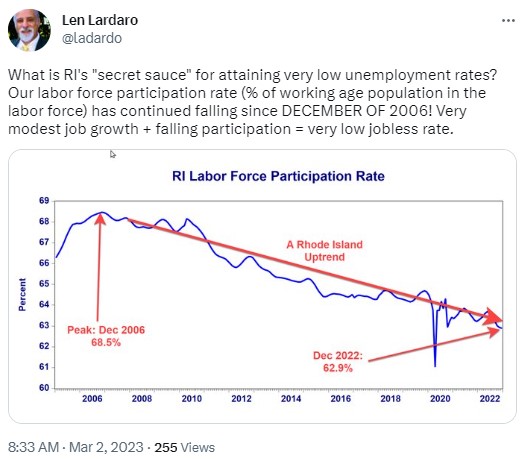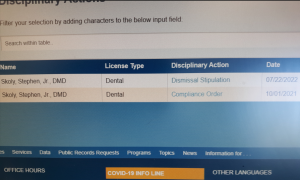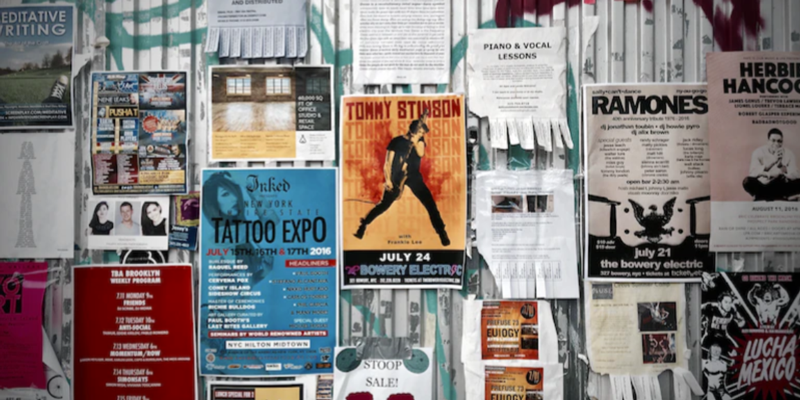Sometimes the lack of response to statements — I mean just an ordinary, slightly skeptical response — is striking. Here’s Warren Town Manager Kate Michaud asking the U.S. Senate to protect the town from an apocalyptic future:
“The data analysis concluded that by the year 2100, three hundred and six of the area’s four hundred buildings could be lost to the rising water,” Michaud told the committee. “With three feet of sea level rise in the next 30 years, three of the town’s major roads, including the primary evacuation route, would be flooded with salt water and impassable every day at high tide.”
Projections can produce numbers; that’s what they do. It’s good practice, however, to step back and put them in more-tangible form for a plausibility gut check. 306 out of 400 buildings in an area is more than 75% (three in four). Michaud’s testimony asserts that the town “predicts” three feet of water rise in water from 2017 to 2047.
NOAA tide data from Newport puts the 100-year trend at 2.85 millimeters per year of increase. We’re currently five years of the 30 into Michaud’s prediction — 17% of the timespan supposedly bringing a three-foot water rise — and even taking this climate-change-friendly data source at face value puts the increase below that trend, at 12 millimeters. The trend to hit three feet in 2047 would have to be a huge curve upward, and if that doesn’t happen, the 100 year destruction of 75% of the Warren neighborhood seems implausible.
Again, let’s get away from the numbers. Michaud is claiming that by the time a child born today begins to reach full adulthood, when she’ll probably be into her retirement, the water will have permanently risen nearly the full difference between low tide and high tide. Does that seem plausible?
Whatever your answer, the timespan raises an important question that nobody asks: Will there be any consequences at all for Michaud (whom, not to be unfair, I’m merely presenting as a proximate example of a great many people) if this dire prediction turns out to be laughably wrong? Of course not.
Maybe that should change. How about somebody in government who imprudently terrifies the public in this way should lose her or his pension. Something.
Right now, climate alarmism has only upside, so it’s not surprising how much we see of it.
Featured image by Gustave Courbet on WikiArt.
[Open full post]University of Rhode Island Economics Professor Len Lardaro reminds us of the magic by which the state makes its employment numbers look good:

To me, the apologists for the status quo are the scariest part. Saying, “Oh, don’t worry. People are just retiring,” completely misses the point.
If Rhode Islanders are retiring, shouldn’t their jobs remain for somebody else to fill? That’s the problem. RI is not generating a sustainable path for continued economic health.
If somebody wants to stay here, for whatever reason, he or she has to find a way to make money. If their jobs stop when they do, they weren’t really “Rhode Island jobs.” They were always “that-person jobs.” The state is not creating opportunity; it’s just cashing in on the people who happen to live here and whatever it was that kept them around.
I’ve been making variations of this point for nearly 25 years, now. (Sometimes, I’ve had to argue with Lardaro about it.) States must provide opportunity that draws people to them and sustains jobs distinctly from the people who currently hold them. This is especially true for a state, like Rhode Island, that has built so much fixed operating cost into its economy in the form of government.
[Open full post]On WNRI 1380 AM/95.1 FM, John DePetro and Justin Katz discuss:
- Cicilline opens up a Congressional seat (others race to fill)
- Cienki opens up a GOP chair seat (that others sort of consider)
- Retiring police open up jobs (that nobody qualified seems to want)
- A school committee member hasn’t yet opened up a vacancy (that her behavior probably should create)
Featured image by Neroli Wesley on Unsplash.
[Open full post]For several reasons (voluntary and not-so-voluntary), I’ve been digging into Marxism a bit more over the past year. I mean both ol’ Marx himself and his followers, up to modern practitioners. One point that has come home very strongly is that the ideal that Marxists sell is actually the end toward which a system built on free markets and political liberty draws us. The difference is that Marxists want a short-term dictatorship so they can be sure the result conforms with their own prejudices.
This general observation applies to turbulent questions of race, too. Consider:
In his new book The Real Race Revolutionaries (December 2022), Ortiz, a long-time advocate for small business owners and their employees in the US, argues that the government policies that are ostensibly intended to equalize economic outcomes between the white majority and minority groups in America have actually had the opposite effect.
What our society faces is the classic difference between an approach built on assertions of intent and one built on incentives and results. Results are better.
[Open full post]Politics is full of wildcards:
Cicilline said he will resign from Congress effective June 1, 2023, to serve as the next president and CEO of the Rhode Island Foundation.
“Serving the people of Rhode Island’s First Congressional District has been the honor of my lifetime. As President and CEO of one of the largest and oldest community foundations in the nation, I look forward to expanding on the work I have led for nearly thirty years in helping to improve the lives of all Rhode Islanders,” Cicilline said in a statement.
A new congressperson may be good, bad, or indifferent. The same is true of having the political landscape shaken up a bit, because it creates opportunity for change which can be positive or negative.
This development is almost certainly a bad omen for the RI Foundation, though, which has become an increasingly political organization over the past decade.
[Open full post]Let’s see how different the reaction is to this incident compared with vandalism targeting other religious groups.

On WNRI 1380 AM/95.1 FM, John DePetro and Justin Katz discuss:
- Racism goes unchallenged on un-Lively Experiment
- The RIPTA set-up
- ACI guards get a generous contract on a pre-long-weekend Friday
- Newsmakers hearts Ruggerio
- A (small) step in a positive direction with the JCLS
Featured image on Shutterstock.
[Open full post]Professor Jean Paul Allain on the Viability of Nuclear Power
Josh Dinner of Space.com on the Artemis Launch
E.J. Antoni of the Heritage Foundation on Consumption Tax
Todd Bensman of the Center for Immigration Studies
Bruce McCandless III author Wonders All Around
Sean Daly – Former Channel 6 Reporter
RI House Minority Leader Michael Chippendale
Mayor Matt Hall on Drinking, Chicken Roping & Axe Throwing in Wyoming
John Rubino the author of The Coming Collapse of the Dollar
Late last month, Dr. Stephen Skoly’s legal team, New Civil Liberties Alliance, filed a response to the State of Rhode Island’s motion to dismiss the lawsuit he had filed for “arbitrarily and unlawfully” ending his surgical practice and for violating his First Amendment rights.
Background: On October 1, 2021, the Rhode Island Department of Health and then-Director Nicole Alexander Scott, MD, via the authority of Governor Dan McKee, ordered Dr. Stephen Skoly to stop caring for patients, stating that he was an “imminent threat to the health of the public” because he declined to get the COVID-19 vaccine. Dr. Skoly has natural immunity against the disease and has sound medical issues that speak against his getting the vaccine. But this did not conform to Governor McKee’s and Dr. Alexander Scott’s rigid, non-scientific vaccine mandate on healthcare workers. Far worse, in their eyes, Dr. Skoly had been vocal about his refusal.
Important to note here that Dr. Skoly has practiced for 35 years without compromise to the health and safety of his staff and patients.
No matter. Dr. Skoly was forced to down tools and cancel two thousand, one hundred patient appointments, including hundreds of appointments for ward-of-state patients, at the order of Governor McKee and Dr. Alexander Scott.
No other healthcare workers were forcibly sidelined by Governor McKee and Director Alexander Scott for failing to comply with the vaccine mandate or any other COVID-19 order. Certainly none of the 854 unvaccinated healthcare workers whom they had knowingly permitted to continue to work without medical exemption in violation of the state’s vaccine mandate (illuminating expose published by Dr. Andrew Bostom in March of 2022).
In fact, McKee and Alexander Scott actually dragged from the sidelines healthcare workers who should have stayed there, stunningly greenlighting in late December, 2021 COVID-positive healthcare workers to work at hospitals and nursing homes (a disturbing development broken exclusively by the Providence Journal’s Kathy Gregg).
No, only Dr. Skoly, with natural immunity and safety measures highly protective of his patients and staff long in place, was such an “imminent threat to the health of the public” that he had to be stopped at all costs from providing healthcare.
In March of 2022, a month after Dr. Skoly and the New Civil Liberties Alliance had filed suit against the State of Rhode Island, Governor McKee and Director Alexander Scott, the Rhode Island Department of Health issued a “Dismissal Stipulation” which, in theory, permitted Dr. Skoly to resume his practice. However, it took them until late September or early October to pull off the RI DOH medical license website the two prejudicial notices, screenshot at right,  they had listed against Dr. Skoly’s license. These had continued to impede Dr. Skoly’s ability to practice, despite the issuance of the Dismissal Stipulation, by making it impossible for insurance companies to cover his patients.
they had listed against Dr. Skoly’s license. These had continued to impede Dr. Skoly’s ability to practice, despite the issuance of the Dismissal Stipulation, by making it impossible for insurance companies to cover his patients.
Anchor Rising contacted both Governor McKee and the Rhode Island Department of Health in October about their actions.
Of Governor McKee, via his communications team, we asked:
Attached is a picture of two items pertaining to Dr. Stephen Skoly Jr, DMD, that were on RI DOH’s website as recently as September 24, 2022. One is a Compliance Order dated October 1, 2021 that ordered Dr. Skoly to cease acting as a healthcare provider until he complies with the Rhode Island regulation requiring immunization against COVID-19. The other is a Dismissal Stipulation dated July 22, 2022. [Editorial note: The Dismissal Stipulation is actually dated March 11, 2022; the July 22 date is presumably the date it was put on RI DOH’s website.]
These items were removed from DOH’s website some time in the past couple of weeks.
> Hundreds of healthcare providers in Rhode Island continued to provide care without complying with the COVID-19 vaccine regulation. Why did Governor McKee allow the RI DOH to target only one healthcare provider, Dr. Stephen Skoly, for enforcement of this regulation?
> If the October 1, 2021 Compliance Order against Dr. Skoly was valid and necessary for the public health, what caused it to be withdrawn?
> Regarding the Dismissal Stipulation of July 22, 2022 , why did it take four months to promulgate it when the Compliance Order against Dr. Skoly was withdrawn around March 11, 2022?
> If Dr. Skoly’s ability to provide healthcare had been restored, why did it take two additional months to remove both the October 1, 2021 Compliance Order and the July 22, 2022 Dismissal Stipulation from RI DOH’s website?
In a second e-mail to Governor McKee:
… the authority to enforce or not enforce a regulation is vested solely with the governor. Hundreds of healthcare providers in Rhode Island provided care without complying with Rhode Island’s COVID-19 vaccine regulation. Enforcement action for not taking the COVID-19 vaccine was taken against only one healthcare provider, Dr. Stephen Skoly.
My question for Governor McKee is, why did he permit and authorize this highly targeted enforcement of the COVID-19 vaccine regulation?
Governor McKee refused to respond to any of these questions.
Of RI DOH, we asked:
… can you shed some light on why it took DOH months to implement these steps in the matter of Dr. Stephen Skoly? Specifically:
> Regarding the Dismissal Stipulation of July 22, 2022 [actually dated March 11, 2022], why did it take four months to promulgate it when the Compliance Order against Dr. Skoly was withdrawn around March 11, 2022?
> If Dr. Skoly’s ability to provide healthcare had been restored, why did it take two additional months to remove both the October 1, 2021 Compliance Order and the July 22, 2022 Dismissal Stipulation from RI DOH’s website?
The issue is that the prolonged timeframe by DOH interfered with his ability to provide much-needed care to his patients; particularly at a time when the pool of healthcare providers has been constricted. Can you / DOH explain the reason for the protracted timeframe?
RI DOH responded:
This was an extraordinary circumstance. It pertained to a disciplinary action for a violation of a health regulation that later expired. The dismissal stipulation was issued after a period of review.
On your second question, the compliance order against Dr. Skoly was not withdrawn. It is simply no longer posted on the disciplinary actions section of our website. Compliance orders are not typically taken down until several years have passed. However, the matter was reviewed, and an accommodation was made in this instance, given the extraordinary circumstances. (The extraordinary circumstances being that this was a violation of a health regulation that later expired.)
RI DOH at least offered a response to Anchor Rising’s questions. However, they did not actually answer the question as to why it took months for them to remove the unwarranted scarlet letters they had affixed, with the authority and approval of Governor McKee, to the license of an innocent healthcare professional that impeded him from offering his vital services to many hundreds of patients.
Governor McKee’s silence on his authorization of this highly selective enforcement against one healthcare professional presumably has to speak for itself. He has no explanation or defense to offer for the highly targeted actions taken by his DOH under his authority – perhaps because there is none.
[Open full post]On WNRI 1380 AM/95.1 FM, John DePetro and Justin Katz discuss:
- The housing czar gets masked severance
- Intriguing elimination of primaries
- Illegals voting… legally?
- Providence police chief as midlevel politician
- Retirement benefits for “public service” in Warwick
- Sales tax messaging
- A farmer’s market Nazi sighting
- Secretary of State Greg Amore’s disrespect for his office.
Featured image by Yonghyun Lee on Unsplash.
[Open full post]







